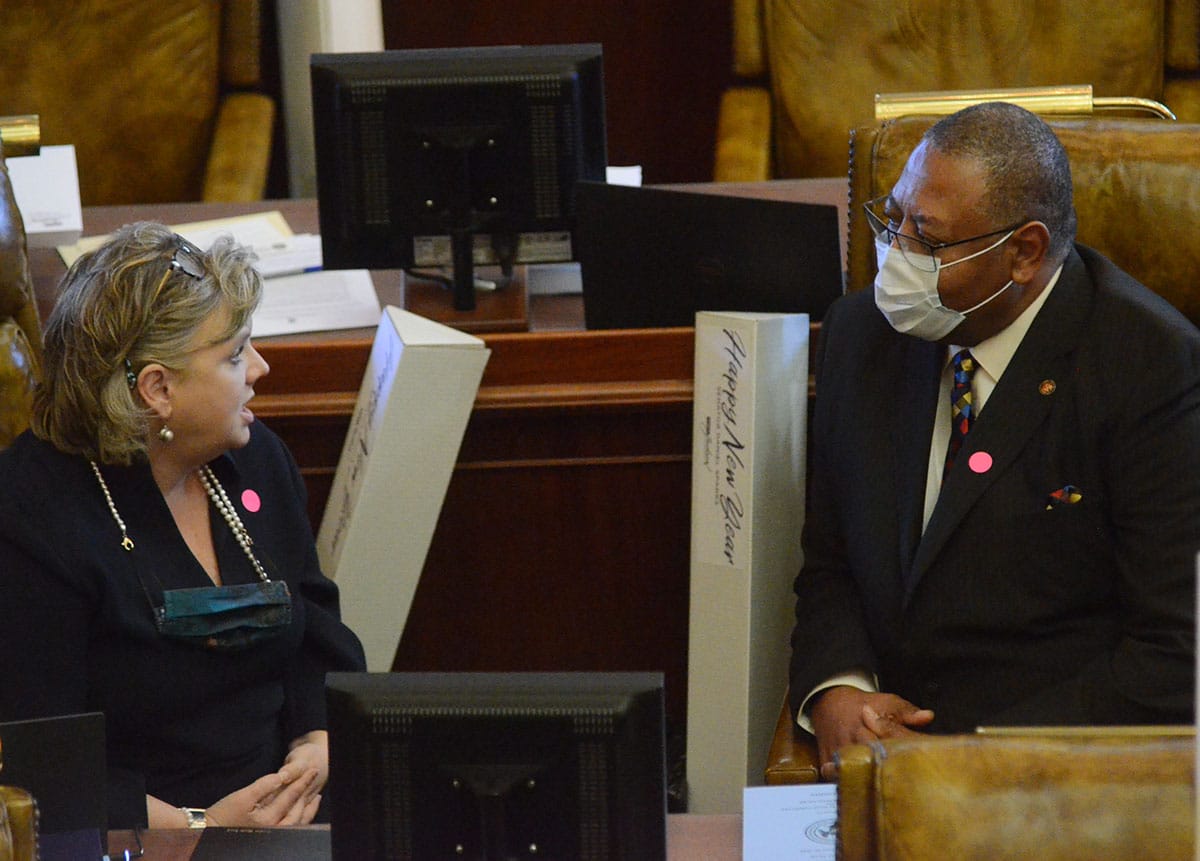Mississippi Today
Universities closure bill expected to die, but will proposed ‘efficiency’ task force keep issue on the table?

A bill to close three public universities in Mississippi will die as expected after inspiring a weeklong ruckus that some lawmakers blamed on misleading news articles.
But another bill that advanced in the Senate Universities and Colleges Committee on Monday has raised questions abouts its potential to yield similar results. The sponsor said that isn’t the intention.
The author of controversial Senate Bill 2726, Sen. John Polk, R-Hattiesburg, seemed relieved his bill’s death was official. It would have required the governing board of Mississippi’s eight public universities to shutter three by 2028 after analyzing criteria such as enrollment, economic impact or any other “special factors.”
“Please, everyone, get that message out: The chair has killed my bill,” Polk said during the Senate Colleges and Universities Committee meeting. “And that way I can sleep at night.”
Senate Bill 2725, by Committee Chair Nicole Boyd, R-Oxford, would require a similar analysis of factors. The legislation, Boyd explained, was inspired by a hearing earlier this session on the impending decline in high school graduates going to college that is poised to hurt the bottom-lines of Mississippi’s tuition-dependent universities.
If her bill becomes law, a 10-member task force — a mix of lawmakers and appointees representing the regional colleges, HBCUs and research institutions — would review IHL’s funding formula, the system’s physical plant, enrollment and graduation rates, and any existing plans to tackle the enrollment cliff.
Then the task force would make recommendations to the Legislature with an eye to increasing efficiency and the number of Mississippians with college degrees.
“This bill looks at really what is going on at our colleges and universities as they are right now, what we need to do in regard to that enrollment cliff that we see is coming,” Boyd told committee members. “We need to be proactive in helping our universities and colleges manage this.”
Sen. Sollie Norwood, D-Jackson, asked if Boyd anticipated the task force making a recommendation to address the building deficiencies at the HBCUs which, despite a decades-long settlement, many alumni say continue to be underfunded. At Alcorn State, students have complained of mold in the dorms, and Jackson State has sought to upgrade its water system since the water crisis in 2022.
Boyd replied that she could not say what the task force’s findings would be and added that all of the universities struggle with deteriorating infrastructure.
After the meeting, Boyd told Mississippi Today that she can’t say closing universities is off the table for the task force, but that it is not her intention with the bill. She said the goal is to ensure tax dollars are meeting the universities’ needs.
“Everybody is trying to look at how we can make our IHL system the most efficient and effective to get a strong Mississippi workforce,” she said.
Polk’s bill would have put the decision on closures in the hands of the Institutions of Higher Learning Board of Trustees.
More than 14,000 people had signed an online petition calling for the bill’s death. The local newspaper in Columbus, home to Mississippi University for Women, published an op-ed against it. And alumni of Mississippi’s historically Black public universities decried the bill, with some saying they didn’t trust the IHL board, which is mostly comprised of graduates of the state’s three largest predominantely white institutions, to make a fair decision.
“We urge you, as elected representatives of the people of Mississippi, to recognize the profound value of all our state’s institutions by opposing this bill and working together to shift the focus from closure to investing to further strengthen these vital institutions,” read a letter from the alumni association presidents of Alcorn State University, Jackson State University and Mississippi Valley State University.
Though the bill was depicted by some news articles as targeting the three HBCUs, Polk and other lawmakers had suggested that more likely in its crosshairs were on the three smallest universities by enrollment: MVSU, Delta State University and Mississippi University for Women.
After Boyd confirmed she was not bringing Polk’s bill before the committee, she apologized to him for what she called misinformation.
“It’s a little bit ironic to me that this bill and this legislation has been so misquoted,” she said. “Clearly we might have some literacy issues that we need to look at, because … what his legislation said and what it was purported to say were entirely two different things.”
This article first appeared on Mississippi Today and is republished here under a Creative Commons license.![]()
Mississippi Today
Trump appoints former Gov. Phil Bryant to FEMA Review Council as state awaits ruling on tornadoes
President Donald Trump has appointed former Mississippi Gov. Phil Bryant to the FEMA Review Council, which Trump has tasked to “fix a terribly broken system” and shift disaster response and recovery from federal to state government.
The appointment comes as Mississippi awaits a response from the Trump administration on whether it will approve Gov. Tate Reeves’ request for a federal disaster declaration for deadly tornadoes in mid-March. The federal declaration, which Reeves requested April 1, would allow families and local governments devastated by the storms to receive federal assistance. Trump recently denied a similar request for Arkansas.
Trump has said states should shoulder more of the burden for disaster response and recovery, and he and Homeland Security Secretary Kristi Noem have threatened to shut down the Federal Emergency Management Agency altogether.
“I am proud to announce the formation of the FEMA Review Council, comprised of Top Experts in their fields, who are Highly Respected by their peers,” Trump wrote on social media. “… I know that the new Members will work hard to fix a terribly broken System, and return power to State Emergency Managers, who will help, MAKE AMERICA SAFE AGAIN.”
Trump listed other members of the council, including Secretary of Defense Pete Hegseth and Govs. Greg Abbott of Texas and Glenn Youngkin of Virginia.
Bryant, a longtime political ally of Trump, on social media wrote he is, “Honored to receive this appointment …” and that “Unfortunately, we’ve earned a lot of experience with natural disasters and recovery in Mississippi. Let’s Make America Safe Again.”
Mississippi saw seven deaths and an estimated $18 million in destruction from multiple tornadoes on March 14-15, the same storm system that caused damage in Arkansas. The Mississippi Emergency Management Agency reported that 233 homes were destroyed across 14 counties, and hundreds more were damaged.
During the initial aftermath, Reeves told reporters he believed there was a “high likelihood” the state’s damages from the March tornadoes would meet the threshold for FEMA’s Individual Assistance, which provides direct payments to disaster victims.
The Trump administration’s FEMA has denied federal assistance for flooding in West Virginia, tornadoes in Arkansas and a storm in Washington state, and refused North Carolina’s request for extending relief after Hurricane Helene.
After Hurricane Katrina’s devastation in 2005, Mississippi received nearly $25 billion in federal relief spending, which state leaders have credited with saving the state from ruin and allowing communities and families to rebuild.
This article first appeared on Mississippi Today and is republished here under a Creative Commons Attribution-NoDerivatives 4.0 International License.
Note: The following A.I. based commentary is not part of the original article, reproduced above, but is offered in the hopes that it will promote greater media literacy and critical thinking, by making any potential bias more visible to the reader –Staff Editor.
Political Bias Rating: Center-Right
The content presents a fairly neutral tone but leans towards a center-right perspective, particularly in its framing of President Trump’s actions and the appointment of former Mississippi Governor Phil Bryant. It highlights the argument for more state-level responsibility in disaster management, a position typically associated with conservative views. The reference to the Trump administration’s denial of federal assistance to certain states, including Arkansas, aligns with a more fiscally conservative stance that prioritizes reducing federal intervention. However, the mention of the substantial federal aid Mississippi received after Hurricane Katrina adds a historical balance to the perspective, indicating that the piece does not fully align with extreme conservative views.
Mississippi Today
Chris Lemonis fired, national search underway for Mississippi State baseball
Not quite four years after guiding Mississippi State to a baseball national championship, head coach Chis Lemonis has been fired, effective immediately.
Assistant coach Justin Parker will serve as interim head coach for the remainder of the season.
Mississippi State made the announcement in a press release Monday afternoon.
“A change in leadership is what is best for the future of Mississippi State baseball,” State athletic director Zac Selmon said. “We have not consistently met the standard of success that our university, fans and student-athletes expect and deserve. I want to thank Coach Lemonis for his work and the time he gave to our program, including a national championship in 2021. We appreciate his efforts and wish him and his family all the best moving forward.”
A national search is underway to identify the program’s next head coach, Selmon said.
“In a team meeting moments ago, I expressed to our student-athletes the confidence we have in their abilities and the potential they have for the remainder of the season,” Selmon said. “I encouraged them to compete with pride, resilience, and intensity. With the hard work, preparation, and talent already within this group, we are committed to putting them in the best position to finish the season competing at the highest level.
“Mississippi State is the premier job in college baseball. The tradition, the facilities, the NIL offerings and the fan base are all second to none. Dudy Noble Field is the best environment in the sport, period.”
The current Bulldogs have a 25-19 record and are 7-14 in the SEC. Most recently, the Bulldogs lost two of three weekend games to Auburn, the nation’s 11th-ranked team. State has lost its last two SEC series and five of seven this season. The Bulldogs are currently No. 45 in the nation in ratings percentage index (RPI) and are in danger of not making the NCAA Tournament for the third time in four years.
Lemonis’ MSU teams won 232 games and lost 135 in his six-plus seasons. Hired by former MSU baseball coach and athletic director John Cohen from Indiana, Lemonis has an overall coaching record of 373-226-2.
“This program is built for success,” Selmon said. “Our history proves it, and our future demands it. We are one of only four programs in NCAA history to reach the College World Series in six consecutive decades. With 40 NCAA Tournament appearances, 12 trips to Omaha, 11 SEC regular season titles, and a national championship, our program has always been a national contender. That is the bar. We’re going to find a leader who will embrace that, elevate our program and compete for championships.”
This article first appeared on Mississippi Today and is republished here under a Creative Commons Attribution-NoDerivatives 4.0 International License.
Note: The following A.I. based commentary is not part of the original article, reproduced above, but is offered in the hopes that it will promote greater media literacy and critical thinking, by making any potential bias more visible to the reader –Staff Editor.
Political Bias Rating: Centrist
The content provided is a straightforward news report about the firing of a baseball coach, Chis Lemonis, following his achievement of winning a national championship. The information is factual and does not indicate any political leaning, ideology, or bias. It is neutral in tone and intent.
Mississippi Today
MS House member agrees to pre-trial program after indictment
Rep. Keith Jackson, a Democratic lawmaker from Kemper County, can remain in office despite a felony indictment by participating in a pre-trial intervention program, according to court documents.
A grand jury last year indicted Jackson, a first-term House member, on charges of receiving stolen property – specifically, a 2006 Magnolia timber trailer worth about $15,000. The grand jury also indicted two other people, Fredwrick (sic) Young and William Tate, in connection with the criminal charges.
Jackson did not respond to a request for comment, and his attorney, Christopher Collins, declined to comment.
Cassie Colman, the district attorney in the 10th circuit district, told Mississippi Today that the state agreed to let Jackson participate in pretrial intervention because he had no prior criminal record. If Jackson completes the terms of the pre-trial agreement, then the criminal charges will be expunged from his record.
Going to trial would likely be risky for the lawmaker because, if convicted of the offense, he could lose the right to hold elected office.
Receiving stolen property is a disenfranchising crime in Mississippi, and if someone is convicted of a disenfranchising crime, they lose their right to vote. To run for office in Mississippi, someone must be a registered voter.
But Coleman, who prosecuted the case against Jackson, said the legislator’s agreement to enter the program is neither a guilty plea nor a conviction. Instead, he will enroll in the intervention program for at least a year and pay around $3,350 in fees, according to court documents.
If he fails to meet the terms of the agreement, the district attorney could remove him from the program and prosecute him for the original crime.
This article first appeared on Mississippi Today and is republished here under a Creative Commons Attribution-NoDerivatives 4.0 International License.
Note: The following A.I. based commentary is not part of the original article, reproduced above, but is offered in the hopes that it will promote greater media literacy and critical thinking, by making any potential bias more visible to the reader –Staff Editor.
Political Bias Rating: Centrist
The article presents factual information about a Mississippi House member’s legal situation, focusing on the details of the pre-trial intervention program and the potential consequences if he fails to meet the terms. There is no overt political commentary or slant, and it primarily reports on the legal process and actions taken by both the accused lawmaker and the prosecuting district attorney. The tone is neutral, and it avoids sensationalizing the case or making political judgments. Given the absence of opinion or partisanship, the content is categorized as centrist.
-

 SuperTalk FM7 days ago
SuperTalk FM7 days agoNew Amazon dock operations facility to bring 1,000 jobs to Marshall County
-

 News from the South - Missouri News Feed3 days ago
News from the South - Missouri News Feed3 days agoMissouri lawmakers on the cusp of legalizing housing discrimination
-

 Mississippi Today2 days ago
Mississippi Today2 days agoDerrick Simmons: Monday’s Confederate Memorial Day recognition is awful for Mississippians
-

 News from the South - Florida News Feed7 days ago
News from the South - Florida News Feed7 days agoFederal report due on Lumbee Tribe of North Carolina’s path to recognition as a tribal nation
-

 Mississippi Today5 days ago
Mississippi Today5 days agoStruggling water, sewer systems impose ‘astronomic’ rate hikes
-

 News from the South - Georgia News Feed7 days ago
News from the South - Georgia News Feed7 days agoOrganization files ethics complaint against Warnock | Georgia
-

 News from the South - West Virginia News Feed5 days ago
News from the South - West Virginia News Feed5 days agoIs West Virginia — and the rest of the country — prepared to care for our seniors?
-

 News from the South - West Virginia News Feed7 days ago
News from the South - West Virginia News Feed7 days agoWork Zone Safety Week takes on extra meaning after recent WV worker's death













































